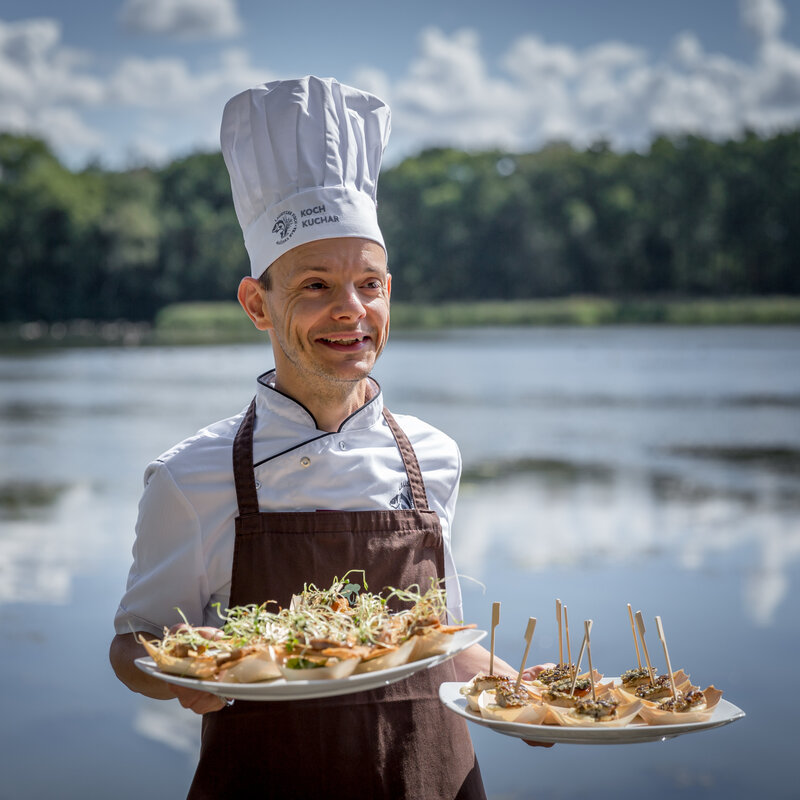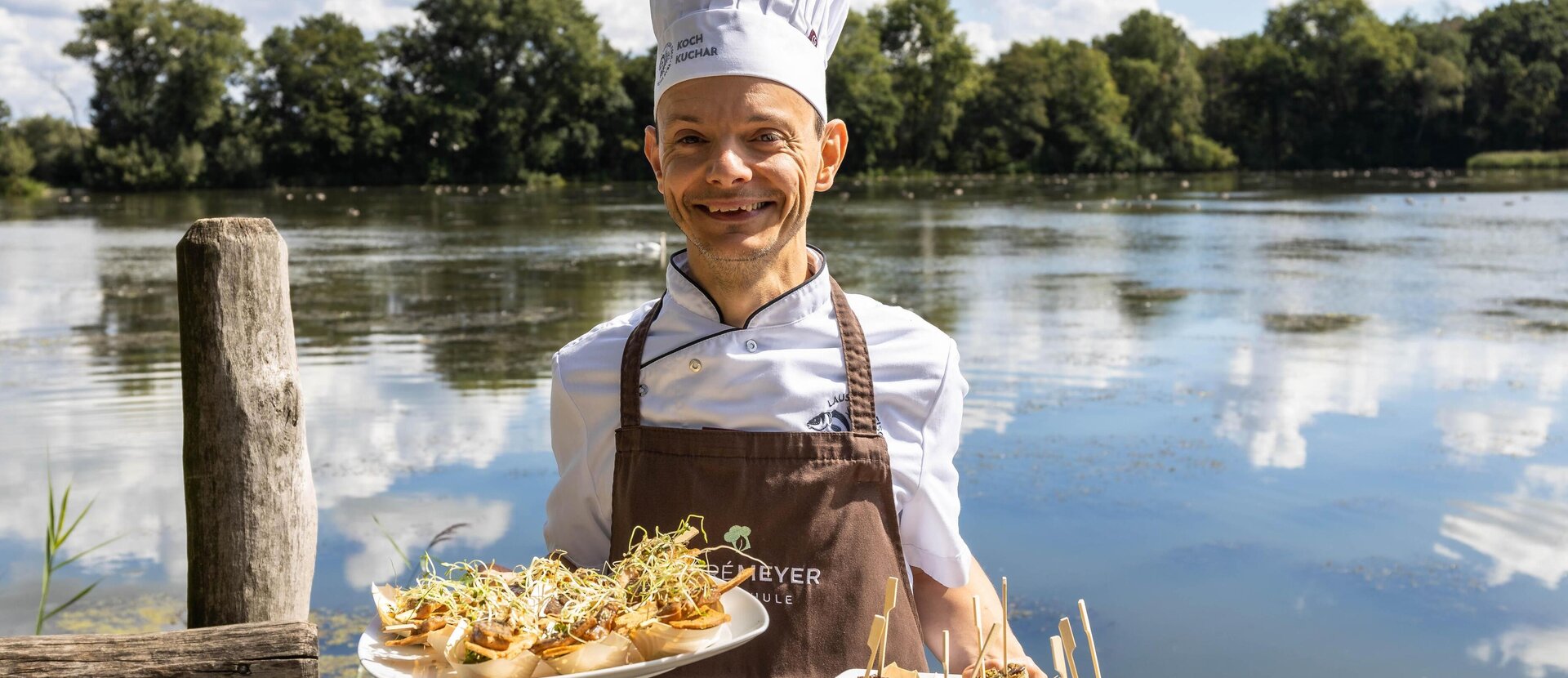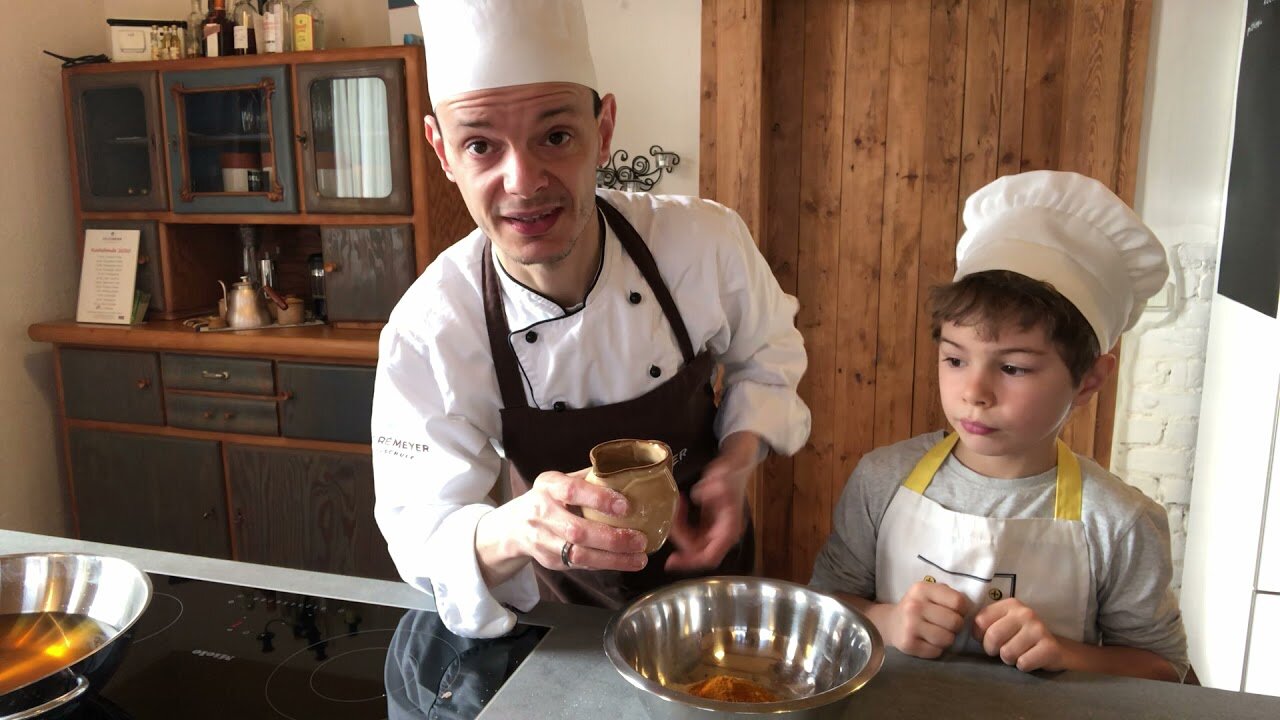
Culinary delights are redefined on the picturesque Beckenberg near Eibau. André Meyer, head chef and owner of the Beckenbergbaude organic mountain inn, combines traditional recipes from Upper Lusatia with modern accents and a deep commitment to regionality and sustainability. In this interview, he reveals how he creates taste sensations from simple ingredients and what inspires him to do so.
Mr. Meyer, what sparked your passion for food?
My passion for food began in my childhood. My mother always tells me that I started cooking with a small toy stove when I was three years old - with water and a stock cube as ingredients. Later, I was allowed to train as a chef in the Zittau Mountains. There I learned that instead of a stock cube, a soup should of course contain bones and roasted vegetables. This enthusiasm for cooking has been with me ever since.
What was your career path to Beckenbergbaude?
After my apprenticeship, I initially worked at the company where I trained, then I was headhunted to a new catering establishment and later changed jobs again. But I always stayed in the Zittau Mountains. I completed my apprenticeship training on the side because it was important to me to pass on my knowledge. During this time, I heard that the Beckenbergbaude was looking for a tenant. I applied when I was 21 and, thanks to the support of my parents, I got the chance to make my dream come true. I've now been here for almost 24 years.
What do food and enjoyment mean to you personally?
For me, food is a passion - both when cooking and when enjoying it. I appreciate it when a dish tastes natural and the flavors can be experienced in the mouth. As a chef, the best compliment is when guests say: "That tasted great!" This direct feedback is unique.
What makes Upper Lusatia special for you as a culinary region?
Upper Lusatia is incredibly diverse. There are Bohemian influences in the Zittau area, Silesian influences in Görlitz and Sorbian influences around Bautzen. I find old recipes such as Präglsaalz or Stupperle, which have almost been forgotten, particularly exciting. Reviving these Upper Lusatian cooking traditions is a matter close to my heart.
Is there a typical dish or a regional product that you particularly associate with Upper Lusatia?
If I had to name one that is typical and that visitors to the region should definitely try, it would be Teichelmauke. It's a wonderfully hearty dish that shows how we can conjure up something special with simple ingredients. Many other dishes have almost been forgotten. Thanks to my grandmother's old notes, I have rediscovered them. These traditional recipes are a real treasure trove for Upper Lusatian cuisine.
How do you manage to integrate traditional dishes into your modern cuisine?
I try to interpret traditional dishes like Stupperle in a more modern way. Instead of the classic preparation with sauerkraut and bacon onions, I serve them in summer with ratatouille vegetables and a hint of hard cheese - similar to gnocchi in Italian cuisine. This results in light, contemporary variations that go down well.
What inspires you to create new dishes?
I find inspiration everywhere - when reading recipes or on the go. Sometimes an idea just pops into my head. It's always exciting to see how guests react to it. Some ideas become a hit, others are more of an experiment.
Do you have a personal favorite dish?
Jacket potatoes with quark - simple, but soul food for me. Whether with linseed oil or a good liver sausage, this dish gives me energy and helps me switch off. It's a must for me once a week.
What role do regionality and sustainability play in your cuisine?
A very big one. I want to know where the ingredients come from and how they were produced. For me, regionality means preserving the diversity of our region, for example our tasty Lusatian fish. For me, sustainability also includes animal welfare. For me, this is part of the ethics of cooking.
The idea of turning the Beckenberg-Baude into an organic mountain inn - was that your goal from the outset, or did it develop over time?
When I started in 2001, organic was not yet a goal. But I knew that no overfished fish would be on my menu - sustainability has always been important to me. We became certified organic in 2013, initially with a mix of conventional and organic products. Over the years, we have integrated more and more organic ingredients, also thanks to the positive feedback from our guests. In 2023, we took the final step and now work with 100% organic products. Of course, there is also skepticism, but most guests appreciate this philosophy and support us in it.
What do you wish for the culinary future of Upper Lusatia?
I hope that the people of Upper Lusatia will show their pride in our region and its diversity to the outside world. There are so many good things that we can be proud of - not just in terms of cuisine, but also in terms of the landscape and culture. My wish is that we communicate and live these values more strongly. Of course, there is always room for criticism. But anyone who criticizes should then say at least twice what is beautiful about Upper Lusatia.





